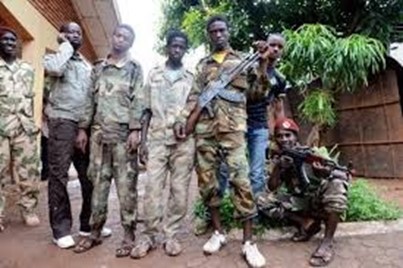217 Ex-Seleka Rebels Surrender Weapons In CAR
As rebel uprising continues in the Central African Republic, some Seleka group rebels have given up arms.

Two hundred and seventeen former fighters of the Seleka rebel movement have voluntarily laid down their weapons in the Central African Republic capital, Bangui.
The repentant rebels have also been demobilised in a former military camp in the northern outskirts of Bangui.
The ex-Seleka fighters who were members of the 14 armed groups that signed a peace accord with the Central African Republic government in 2019 voluntarily gave up arms on Wednesday, Feb. 24, in respect of the said 2019 peace accord.
They handed over their arms to the mobile team of the execution unit of the national programme of disarmament, demobilisation, reintegration and repatriation (UEPNDDRR).
The arms included AK47 rifles, rocket launchers, MAS-36 guns, ammunition cartons, and other military gadgets.
The arms have been kept in a container. They would be taken care of by Blue Helmets of the United Nations Organization Multidimensional Integrated Stabilization Mission in the Central African Republic (MINUSCA). The latter are partners in the UEPNDDRR operation.
According to Samuel Touatena, the Coordinator of the UEPNDDRR, “the objective is to bring peace to the Central African Republic and also encourage the ex-combatants to liberate the localities (former military camps) as well as the houses of particular individuals they have occupied for the last eight years.”
Speaking on behalf of his colleagues during the disarmament ceremony, one of the former fighters, Gildas Binguibanga-Tchenegolo, confessed to the crimes they committed against the area’s inhabitants, forcefully occupying their houses and inflicting violence on them.
He swore they would not return to their evil ways again.
During the disarmament, former fighters are given two opportunities to either be integrated into the national army if they are found eligible after a rigorous medical examination, a physical test and a written examination to determine their education level or to integrate socio-economic life by selecting a trade of their choice.
Anyone that chooses a trade would be made to undergo professional training, after which he would be given professional kits to facilitate their take off.
Support Our Journalism
There are millions of ordinary people affected by conflict in Africa whose stories are missing in the mainstream media. HumAngle is determined to tell those challenging and under-reported stories, hoping that the people impacted by these conflicts will find the safety and security they deserve.
To ensure that we continue to provide public service coverage, we have a small favour to ask you. We want you to be part of our journalistic endeavour by contributing a token to us.
Your donation will further promote a robust, free, and independent media.
Donate HereStay Closer To The Stories That Matter




